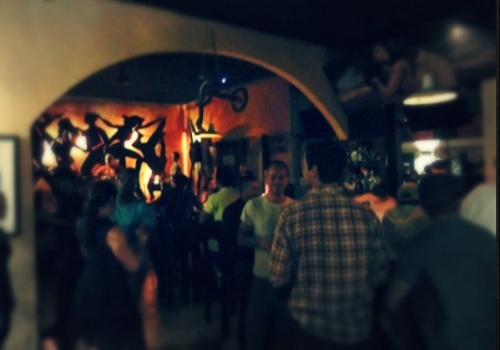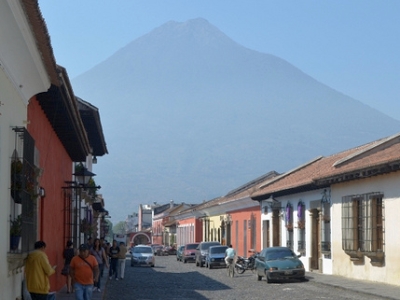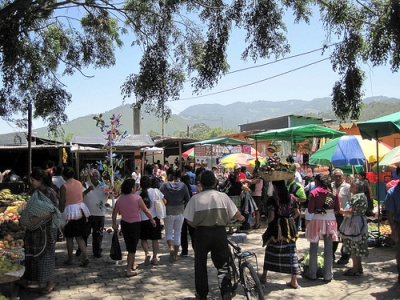Pleasure And Necessity: Expats Adrift In Antigua, Guatemala

“Hop on! Just make sure you don’t burn your leg on the exhaust.”
I straddled the back third of the scooter seat behind my newfound gringo and gringa companions, Luke and Leta, and started looking for a bar or something to grab onto.
“Put your hands around my waist, no need to be shy,” Leta told me. Hearing that from an adorably freckled 20-year-old girl with bright blue eyes let me know that my night was beginning fortuitously, even if she meant it in a prosaic, crowded-scooter kind of way.
“We have to make a beer run first, hope you don’t mind,” Luke said. Or at least that’s what Leta relayed to me — I couldn’t make out most of the syllables from the front of the bike.
The jaunt to the convenience store was a short one but I was already enjoying the cool night air and the stares from the Guatemalan and European tourists heading to the bars and restaurants near Parque Central. We passed a Guatemalan police officer.
“You’re actually not even allowed to have two people on one of these,” Luke told us. “It’s to prevent drive-bys.”
Huh. I wasn’t surprised. I had just spent the week working in Guatemala City, one of the most dangerous cities in the Western Hemisphere. I actually enjoyed my time in Guate (GWA-tay), as locals call it, but the tension was undeniable. Guatemalans were constantly warning me to be careful, and I saw plenty of evidence that the warnings were justified. Nearly every storefront had an armed security guard, most of whom looked like nervous high school students. Every day, newspaper articles piled multiple murder stories into one big article, kind of like the morning fútbol round-up, except with more scoring. Several people mentioned to me that in 2009, more Guatemalan civilians were shot, stabbed or beaten to death than in the Iraq war zone. Ninety-seven percent of all murders in Guatemala go unsolved.
I was able to report my story without a single gunshot wound and didn’t have any other problems with crime, but the stories of kidnappings and roadside robberies had made me feel a bit paranoid, and I was looking forward to decompressing in Antigua before the flight back to New York. I had asked Matt Stabile, the editor of this website, whether he was interested in a story from Guatemala, and he recommended I get in touch with Luke Maguire Armstrong, a russet-headed friend of his who also contributes to The Expeditioner. A few e-mails and text messages later, I was riding caboose on Luke’s scooter, bouncing over cobblestones. As for Leta, she was a couchsurfer from Upstate New York passing through Antigua on a six-month trek through the Americas.
Luke put on his rounded helmet, looking like a dreamt-up spaceman from a bygone era, and we wobbled and swayed our way out of the busy, central part of Antigua. After maneuvering through a few quieter streets, we eventually reached an empty dirt road flanked by dense tropical brush; the headlight illuminated flashes of atavistic hunter greens and impudent harlequins. The beers were in cans and didn’t clang around too much on the rough terrain.
We reached a gated community and Luke spoke to an armed security guard in accented but competent Spanish. The guard wrote in a book quite deliberately for a few awkward minutes and then let us in.
“How do you two know each other?” Maggie asked Luke and me after inviting us inside. She was another gringa abroad, a friend of Luke’s, and was hosting us at the one-story house that she rented along with two Salvadoran twin brothers, one of whom she was dating. It had a stone fountain in the middle of the living room, a fireplace, big bedrooms and lots of reassuring bars on the windows, not to mention a couple of goofy-looking boxer puppies tromping around. I had to ask the inevitable question that New Yorkers ask everyone else in the world.
“We pay about $500 a month between the three of us,” Maggie told me. Did I mention that she had the muscle tone and firm personality of a capoeira instructor? At that point, I was finishing my first tall boy and feeling dreamily observant.
As I’ve done many times before, in places like Milwaukee and New Jersey, I proceeded to rant about just how ridiculously cheap her rent was, and how the apartment looked like the type of place that one could settle into and write a novel.
 “It’s not that cheap when you’re working down here, earning Guatemalan money,” she said. “I’m bartending, so I basically make enough to cover rent.” I was already disconnected from any empathy I might have felt toward her situation.
“It’s not that cheap when you’re working down here, earning Guatemalan money,” she said. “I’m bartending, so I basically make enough to cover rent.” I was already disconnected from any empathy I might have felt toward her situation.
“I mean, if you could sell one or two freelance stories a month, you could live pretty nicely down here,” I said to no one in particular. “Jesus, my apartment looks like a fucking prison cell next to this place. You’ve got a fucking fountain in your living room.”
I never really got over the rent differential, but with a second beer, I at least turned my attention to other things. Luke had located two out-of-tune classical guitars and he handed me one.
“I don’t know how good those will sound,” one of the brothers said. I wish I could remember their names, but the truth is that I can’t even remember Maggie’s name; I made it up.
Luke tuned his guitar first. We didn’t have a tuner, so he used his ear. I imagined him harnessing an airy melody from the mountains surrounding Antigua. Once he was tuned up, I followed suit, siphoning a low E note, and then tuning the other strings against that. I wondered if the rest of the party – los gemelos, the fit girl, Leta – were dreading the unknown sound that the two of us would generate with these crippled instruments. But I didn’t care. All I wanted to do was play.
Luke began with a gentle, finger-picked ballad, over which I played accompaniment. I was grateful that he had a repertoire of songs to drawn on. We played a few more like that – Luke strumming the rhythm and singing, me adding fill. I overheard Maggie gathering everyone to leave for a bar as Luke started strumming what I figured would be the last song.
It sounded like an Irish pub song, and Luke sang some powerful vocals, the kind that are normally primed by years of drinking whiskey and not by a can and a half of Central American beer, but his voice sounded firm. We played it to its fullest for three verses and choruses, and then responsibly wound it down to a conclusion. Finished, we exchanged a look of mutual satisfaction. It was as if we had entered an acoustic brotherhood.
*
Outside, conversation shifted to the security situation in Guatemala, a thematic discursion likely prompted by the bars on the windows and the dude at the front gate wielding heavy artillery.
“Our friends were robbed,” Maggie said. “Even apartments with bars and security guards still get break-ins.” Someone gave me a cigarette and my buzz increased exponentially.
After another motorbike ride, the night continued at a rooftop bar: drinks, people, more conversations. The mountain air felt like aloe vera on my skin after the raw heat of Guatemala City. Once the party disbanded, Luke, Leta and I ended up back near where we started, sharing a bench in a now-sedate Parque Central.
“So you met Saul Kripke?” Luke asked me.
Actually, I had met Kripke. His name is pronounced “Crip Key.” I was working on a story for Time Out New York magazine about philosopher hangouts in NYC and I somehow ended up on the horn with a well-known art critic and philosopher whose name escapes me. He told me that Saul Kripke was one of the most famous philosophers in New York City. I gave Crip Key a call.
We met at Le Pain Quotidian a week or so later. I had never been there and, honestly, it seemed pretty lame. Kind of like a slightly cleaner Au Bon Pain and I’m sure I’m not the first to make that comparison. I was running late and I had to take a cab, which cut into my already insignificant paycheck. I decided I would only order a tea and wait for him to pick up the check.
Kripke was there, white haired, white bearded, and scrunchy-faced like a baby smelling pepper for the first time. He had a handler next to him, a beautiful young woman in her early 30s, possibly French or Israeli. Judging by how she manhandled philosophical jargon, she must have been an upper level graduate student, although she also appeared to have the kind of intimate knowledge of her employer’s life that you might expect from a personal assistant. Or maybe she was his wife or his daughter, what the hell do I know? They were sitting at an unvarnished table, a signature part of Pain Quotidian décor.
I was late for the meeting because I have a tendency to be late for things, but also because I had been doing some research on Kripke. I thought I had at least a common man’s understanding of philosophy, but Kripke’s stuff made no fucking sense at all. And I was only reading the Wikipedia entry.
Here’s one of his best quotes, according to Google Books:
Humphrey might have won the election (if only he had done such-and-such), we are not talking about something that might have happened to Humphrey, but to someone else, a “counterpart.”
On the topic of philosopher hangouts, Kripke didn’t have much to say. Actually, he seemed to object to the very premise of the interview, repeatedly telling me in a high-pitched and nasal but melodic voice, “I don’t really do anything all that interesting.”
He technically didn’t even live in the city. I think he had a place on the Upper West Side but he lived in Princeton and commuted a couple times a week. He seemed worried about the kind of piece I might write. I reassured him that the article would be of little interest to anyone. After about 30 minutes of haphazard chit-chat, he gave me the name of a supermarket in Princeton as one of his hangouts. I told him that it needed to be in the city.
“Oh, but I hardly ever go anywhere in the city. Sometimes we come here.”
I conceded that I’d have to eat the cab fare on this one, and then said goodbye to Kripke and his lovely Israeli/French sidekick.
*
Luke, Leta and I on the bench.
“Yeah, I met Kripke. Kind of a strange dude, but I guess even if his work is unintelligible it’s because of his level of genius.” And then I told them the story of Kripke.
I woke up the next morning with a legitimate hangover, but feeling the high that comes after a night full of pleasant surprises. I looked at the clock on my Guatemalan cell phone. Just after 10 a.m. Luke was supposed to be hiking a volcano. What a vigorous young man — my goal was brunch.
I showered, grabbed a newspaper and a bottle of water, and returned to the park, where I was supposed to meet Leta.
I haven’t said much about her. She was a bit of a hippie in disguise — a Marxist in J. Crew. The night before, she sat between Luke and me on the park bench with one knee hugged to her chest, saying how amazing it was to meet the two of us on the same day. After some degree of inner reflection, I decided I would participate in a threesome if that was what she was implying, but I knew it wasn’t.
“Sorry to keep you waiting, Luke just dropped me off,” she said. She looked limpid in a breezy dress and flip-flops. We grabbed some breakfast at an upscale Guatemalan café trafficked by tourists and weekenders from Guatemala City. I learned about Leta.
You meet a certain type of gringo backpacker in Latin America. Unlike in Europe, you don’t seem to run into study abroad students. Depending on the country, you won’t even encounter too many other American travelers (expect Kiwis by the jolly dozen). But the expat backpackers you do meet tend to speak Spanish, intoxicate freely and consider socialism a valid – if not necessary – form of government. They may or may not have dreadlocks, but in all cases, they respect people who do. In other words, these are cool folks.
Leta was no exception. After brunch we returned to Parque Central and passed more time on a bench. The plaza was still bustling.
“Tengo Biblias! Se vende Biblias!” A little boy — maybe eight years old — yelled, trying to sell Bibles in the square. Oddly, we had been talking about God, or the lack thereof, a little while before. The boy sat down on the bench next to Leta.
“Tengo Biblias,” he said halfheartedly. His gaze was fixed absentmindedly across the square. Apparently he didn’t sell a lot of these, or at least he wasn’t concerned with sales tactics.
“No creo en Dios,” Leta told him. The bluntness of her comment caught him like a slap in the face. He looked dazed.
“¿Y usted. Cree en Dios?” he asked me. “Sí,” I told him, even though the answer is probably more like, “I wish.” In a country where you could never have too much Jesus paraphernalia, I didn’t want to be the asshole who killed Santa Claus on a bright Saturday morning.
Leta was meeting with a friend later, and she pulled out an iPhone that she used for picking up WiFi. I can’t remember if she was actually checking the phone or just playing with it, but at least it shifted our conversation away from the absence of a benevolent deity.
The boy, his name was David, didn’t seem to be too familiar with the iPhone, and she showed him how the touch screen worked. He asked how much it was worth, and when she told him, in quetzales, I thought about how many Bibles he would need to sell to make that much money.
“¿Tu peso?” David asked. In addition to the Bibles, he had a scale that he carried around so that people could get an up-to-the-minute heft assessment. I told Leta she should try it, but in the end we both passed. David stayed with us a while longer on the bench, then decided to continue working the square.
 Leta and I took a walk to a nearby craft market that catered to tourists who were looking for something a little nicer than what you might find on the street. We walked into an open-air courtyard surrounded by stalls, and strolled from stall to stall, considering an occasional trinket: earrings, necklaces. I was looking for something for my girlfriend.
Leta and I took a walk to a nearby craft market that catered to tourists who were looking for something a little nicer than what you might find on the street. We walked into an open-air courtyard surrounded by stalls, and strolled from stall to stall, considering an occasional trinket: earrings, necklaces. I was looking for something for my girlfriend.
“I believe in polyamory,” she said. “I don’t think you should have to be with one person just because that’s what society tells you to do.” She went on to explain polyamory to me. I actually didn’t know exactly what it was. And, yes, I wanted to hear her talk more about it, and even see it in action, if possible. “I had this amazing sociology professor and I was talking to him about dating guys, and how I felt about it, and he said, ‘Maybe you’re polyamorous.’ And I think I am. It really does make more sense.”
Of course it does. At least to every guy in the world, including your professor, I thought. But let’s stay away from sexist stereotypes and listen to Leta talk about polyamory.
“This isn’t about sex. I only have sex with one guy. It’s about relationships. There are things that some guys can give me that others can’t, and vice versa. I may want to spend time with a guy, and really enjoy his company, but not fuck him. That’s how polyamory works.”
I was a little surprised/disappointed that her philosophy wasn’t pegged around casual and exhaustive sex, but she certainly had a good point.
We finished perusing the crafts and she offered to take me over to another market, one where locals shopped. It wasn’t far away. We approached some fruit vendors with big baskets of mangos, papayas, guavas and avocados, as well as loads of other fruits I didn’t recognize. We walked between the vendors into an indoor market, a conglomeration of simple wooden stalls covered overhead by corrugated metal panels. We passed people selling all types of foodstuffs: spices out of open sacks, fish, Guatemalan pastries. The walking lanes were narrow and crowded.
There may have been other gringo tourists, but if so, I didn’t see them, and the market didn’t seem particularly geared toward out-of-towners. Mostly people were selling essentials. The vendors were grouped in sections. After the food, we passed through an area where people were selling wooden chairs, followed by an area with electronics, and an area with clothes.
I was running low on clean laundry and bought a pair of socks with the word “UMBRO” stitched into the fabric; the price was negligible by US standards. I got the impression that Guatemalans from more rural areas around Antigua traveled into town on Saturdays, or maybe every day, to sell their wares at this market. Labyrinthine would have described it, and after five minutes of shuffling from stall to stall amid the crowds, I felt the intoxication of the minotaur’s prison, at once amazing and overwhelming.
In an area that could have been the center of the maze, we found some eateries serving traditional Guatemalan dishes. The mini-restaurants were lined up one after the other, people cooking more or less in the open, and a few picnic tables and benches where you could sit down and eat. We found an open table and ordered the menu of the day, soup and fried chicken. I ordered a Coke.
“My problem is that I’ve been dating the same girl for years, but I still don’t want to get married,” I told Leta. “I feel awful. I know she wanted that years ago, but I’m just not ready. I tell myself that I might be ready eventually, but when I think about it, I just can’t believe that will be the case.”
“Then why are you still doing it?”
“It’s complicated,” I said. “We should probably break up, but it’s not that easy.”
A young lady brought my Coke and a glass of ice.
“Should I drink this with the ice?” I asked Leta, afraid of the consequences of drinking unfiltered water. “I’d rather not drink it warm, and they already put ice in the glass.”
“Just drink it, you’ll be fine,” she told me.
By Ted Hesson
[Guatemala by Marina Villatoro/Flickr; Remaining photos by Matt Stabile]

About the Author
 Ted Hesson is a multimedia editor and producer based in Manhattan. For more of his work, visit TedHesson.com
Ted Hesson is a multimedia editor and producer based in Manhattan. For more of his work, visit TedHesson.com
